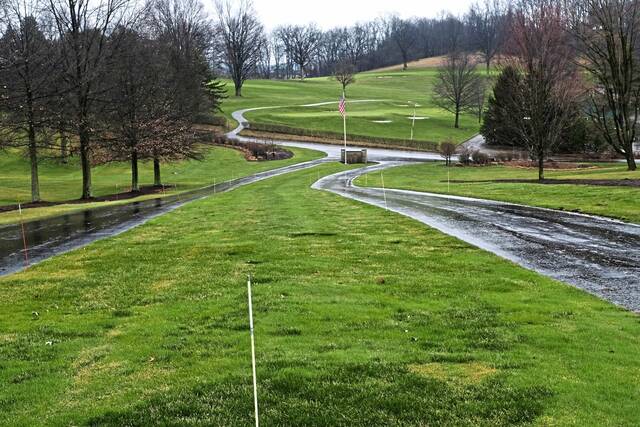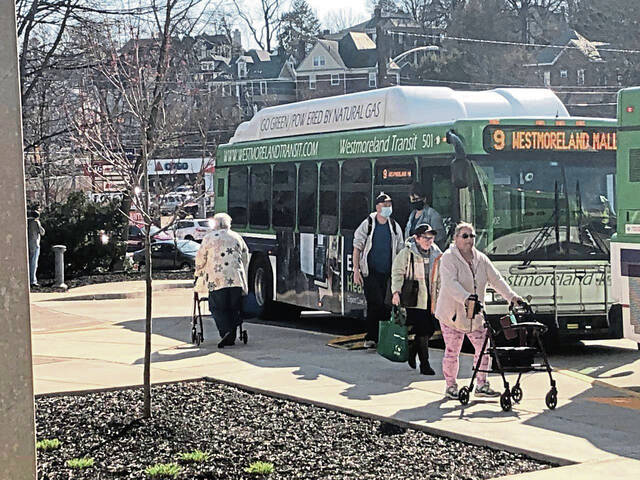Westmoreland commissioners Tuesday said more than $25 million will be spent from the county’s American Rescue Plan funds to address community redevelopment and ease hunger.
For more than a year, commissioners have promised a detailed plan to allocate the $105.4 million earmarked to the county from the American Rescue Plan covid-relief package approved by Congress in 2021. Commissioners on Thursday are expected to vote on a plan to spend the first of what they said could be regular allocations.
“We will be releasing it incrementally, month-to-month, of what the next steps are,” Commissioner Sean Kertes said.
Commissioners said $10.4 million will be directed to the county’s Redevelopment Authority to remove vacant and dilapidated structures in Arnold, Greensburg, Jeannette, Monessen, New Kensington, Penn Borough and Vandergrift.
Another $10 million will be available to municipalities for water and sewer projects.
The Westmoreland County Food Bank is slated to receive $4.4 million.
No money will be used to augment mental health or housing programs in the initial rollout.
“There are a lot of things not included in this yet. We are taking it step by step,” Commissioner Gina Cerilli Thrasher said.
The county is required to have a plan to allocate all $105 million by the end of 2024 and have the money spent at the conclusion of 2026. Commissioner Doug Chew said the county will meet that requirement.
“This is the stuff that has gotten the farthest and is ready to go,” Chew said of the the first round of spending.
Commissioners late last year identified blight removal as a priority for the federal funds.
Specifics on how many blighted structures will be demolished have yet to be determined, and Redevelopment Authority officials will be tasked with submitting plans to demolish buildings in each of the identified communities.
Redevelopment Authority Director Brian Lawrence said the communities chosen for the demolition projects were identified by the U.S. Department of Treasury as part of the ARP program, and about 585 blighted buildings are expected to qualify for demolition.
“Our goal is to demolish about 300 buildings,” Lawrence said.
The program also includes funds to rehabilitate an estimated six multistory, mixed-use properties in downtown areas of the qualified communities, according to officials.
“Strong communities improves the quality of neighborhoods and the health of residents. All this blight is creating an unhealthy neighborhood environment,” Lawrence said.
Officials previously estimated there to be about 1,200 blighted structures in the county.
The authority operates a program to demolish blighted buildings. It is funded by fees assessed when property records are filed. This year, commissioners used money from that fund to award more than $400,000 to demolish a dozen blighted properties in eight communities.
Water and sewer project grants paid for by the county’s ARP funds have yet to be identified.
Commissioners said the federal money will be used to create a grant program for municipalities to apply for funds to pay portions of small-scale projects.
“A lot of local governments do not have the money, so we are offering some form of grant,” Kertes said. “Money can be used for new water lines or new sewer lines.”
Westmoreland County Food Bank Chief Executive Officer Jennifer Miller said the county allocated the agency’s full request, which will be spent over the next two years.
“This is a wonderful opportunity to expand our services,” Miller said.
The money will be used to expand the food bank’s headquarters and warehouse in Salem, institute an onsite food pantry and enhance its ability to deliver fresh produce to public housing sites and areas in need.
According to tax records, the food bank spent nearly $11 million in 2020, the last year for which records were available.
“With inflation and gas prices, the food bank is seeing every walk of life walking through that door now who needs help, needs assistance. We see the urge, the amount of food pouring out every month, and we’re going to do something to help our community,” Kertes said.
Chew said the coronavirus pandemic has made the food bank an essential service for many county residents.
“Before, the food bank would do one to two emergency distributions from their … office every month. Now they do one every other day, and that’s been happening since March of 2020,” Chew said.
The county received about half — nearly $53 million — of its ARP funds last year. It is awaiting the remaining amount, according to the Finance Director Meghan McCandless.
To date, the county has spent a small portion of its allocation on technology enhancement purchases, upgrades to the 911 emergency dispatch system and for bonuses paid to county employees who worked during the pandemic. Commissioners authorized another $7 million to be used for the demolition and reconstruction of a two-level underground parking garage at the courthouse.
On Thursday, commissioners are expected to earmark $518,000 for power upgrades at the courthouse complex and an additional $263,000 for additional computer-related purchases.








